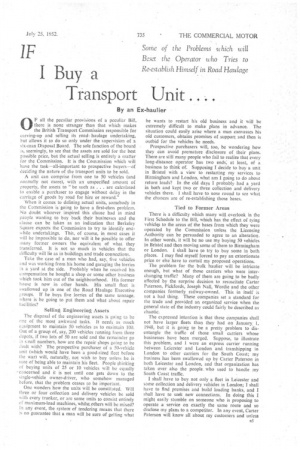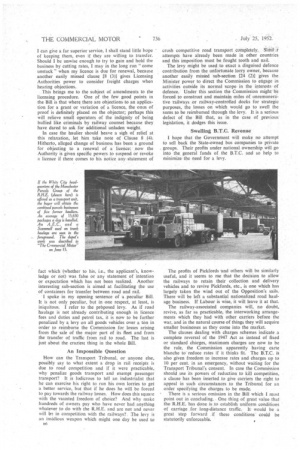1F
Page 39

Page 40

If you've noticed an error in this article please click here to report it so we can fix it.
I Buy a
Transport Unit
By an Ex-haulier
0F all the peculiar provisions of a peculiar Bill, there is none stranger , than that which makes the British Transport Commission responsible for carving-up and selling its roadhaulage undertaking, but allows it to do so only under the supervision of a six-man Disposal Board. The sole function of the board is, seemingly, to see that the assets are sold for the best possible price, but the actual selling, is entirely a matter for the Commission. It is the Commission which will have the task—all-important to prospective buyers—of deciding the nature of the transport units to be sold.
A unit can comprise from one to 50 vehicles (and normally not more), with an unspecified amount of property, the assets to "be such as . . . are calculated to enable a purchaser to engage without delay in the carriage of goods by road for hire or reward."
When it Comes to defining actual units, somebody in the Commission is going to have a first-class problem. No doubt whoever inspired this clause had in mind people wanting to buy back their businesses and the clause can be taken as an indication. that Berkeley Square expects the Commission to try to identify erstwhile undertakings. This, of course, in most cases it will be impossible to do, nor will it be possible to offer many former owners the equivalent of what they transferred. It is not so much in vehicles that the difficulty will lie as in buildings and trade connections.
Take the case of a man who had, say, five vehicles and was working-from his home and garaging the lorries in a yard at the side. Probably when he received his compensation he bought a shop or some other business which took him out of the neighbourhood. His former house is now in other hands. His small fleet is swallowed up in one of the Road Haulage Executive jroirps. If he buys five lorries of the same tonnage, where is he going to put them and What about repair facilities?
Selling Engineering Assets
The disposal of the engineering assets is going to be one of the most awkward tasks. It needs as much equipment to maintain 50 vehicles as to maintain 100. Out of a group of, say, 200 vehicles running from three depots, if two lots of 50 are sold and the remainder go ia small numbers, how are the repair shops going to be dealt with? The prospective purchaser of a 50-vehicle unit (which would have been a good-sized fleet before the war) will, naturally, not wish. to buy unless he. is sure of being able to maintain his fleet. People thinking of buying units of 25 or 10 vehicles wilt be equally ..-concerned and it is not until one gets down to the sinale-vehicle owner-driver, •who somehow managed before, that the problem Ceases to be important.
One wonders how the units will be constituted. Will three or four collection and delivery vehicles be sold with every trunker, or are some units to consist entirely of maximum-load machines, whilstothers will be mixed? in any event, the system of tendering means that there :s no guarantee that a man will ,be sure of getting what
he wants to restart his old business and it will be extremely difficult to make plans in advance. The situation could easily arise where a man canvasses his old customers, obtains promises of support and then is outbid for the vehicles he needs.
Prospective purchasers will, too, be wondering how they can avoid premature disclosure of their plans. There are still many people who fail to realize that every long-distance operator has two ends; at least, of a business to think of. Supposing I decide to buy a unit in Bristol with a view to restarting my services to Birmingham and London, what am I going to do about return loads? In the old days I probably had a yard in both and kept two or three collection and delivery vehicles there. I shall have to nose round to see what the chances are of re-establishing those bases.
Tied to Fortner Areas
There is a difficulty which many will overlook in the
First Schedule to the Bill, which has the effect of tying vehiclees to the areas of the basesfrom which they were operated by the Commission unless the Licensing Authority can be persuaded to agree to an alteratioo. In other words, it will be no use my buying 50 vehicles in Bristol and then moving some of them to Birmingham or London. I shall have to try to buy some in both places. I may find myself forced to pay an extortionate price, or else' have to curtail my proposed operations.
The problem for the bulk haulier will be intricate enough, but what of those carriers who were interchanging traffic? Many of them are going to be badly affected by the surprise decision to resuscitate Carter Paterson, Pickfords, Joseph Nall, Wordie and the other companies formerly railway-owned. This in itself is not a bad thing. These companies set a standard for the trade and provided ao organized service when the general state of the industry cduld fairly be described as chaotic.
The expressed intention is that these companies shall not have larger fleets than they had on January. 1, 1948, but it is going to be a pretty problem to disentangle the traffic of those small carriers whose businesses have been merged. Suppose, to illustrate this problem, and I were an express carrier running between Leicester and London and. transhipping in London to other carriers for the South Coast; my business has been swallowed up by Carter Paterson in both Leicester and London, and that organization has taken over also the people. who used to handle my South Coast traffic.
I shall have to buy not only a fleet in Leicester and
some collection and delivery vehicles in London; 1 shall have to find premises and build loading banks, and I shall have to seek new connections. In doing this I might easily stumble on someone who is proposing to operate .a service on exactly the same route and so disclose my plans to a competitor. In any event, Carter Paterson will know all about my customers and unless
I can give a far superior service, I shall stand little hope of keeping them, even if they are willing to transfer. Should I be unwise enough to try to gain and hold the business by cutting rates, I may in the long run "come unstuck" when my licence is due for renewal, because another easily missed clause 18 (3)1 gives Licensing Authorities power to consider freight charges when hearing objections.
This brings me to the subject of amendments to the licensing procedure. One of the few good points in the Bill is that where there are objections to an application for a grant or variation of a licence, the onus of proof is definitely placed on the objector; perhaps this will relieve small operators of the indignity of being bullied like criminals by railway counsel because they have dared to ask for additional unladen weight.
In case the haulier should heave a sigh of relief at this relaxation, let him take note of Clause 8 (4). Hitherto, alleged change of business has been a ground for objecting to a renewal of a licence;• now the Authority is given specific powers to suspend or revoke a licence if there comes to his notice any statement of
fact which (whether to his, i.e., the applicant's, knowledge or riot) was false or any statement of intention or expectation which has not been realized. Another interesting sub-section is aimed at. facilitating the use of containers for transfer between road and rail.
'I spoke in my opening sentence of a peculiar Bill. It is not only peculiar, but in one respect, at least, is iniquitous. I refer to the proposed levy. As if road haulage is not already contributing enough in licence fees and duties and petrol tax, it is now to be further penalized by a, levy on all goods vehicles over a ton in order to reimburse the Commission for losses arising from the sale of the major part of its fleet and from the transfer of traffic from rail to road. The last is just about the craziest thing in the whole Bill.
An Impossible Question How can the Transport Tribunal, or anyone else, possibly say to what extent a drop in rail receipts is due to road competition and if it were practicable, why penalize goods transport and exempt passenger transport'? It is ludicrous to tell an industrialist that he. can exercise his right to run his own lorries to get a better service, but that if he does he will be forced to pay towards the railway losses, How does this square with the vaunted freedom of choice? And why make hundreds of owners pay who have never had anything whatever to do with the R.H.E. and are not and never will be in competition with the railways?. The levy is an insidious weapon which might one day be used to
B6 attempts have already been made in other countries and this imposition must be fought tooth and nail.
The levy might be used to exact a disguised defence contribution from the unfortunate lorry owner, because another easily missed Sub-section 124 (2)1 gives the Minister power to direct the Commission to engage in activities outside its normal scope in the interests of defence. Under this section the Commission might be forced to construct and maintain miles of unremunerative railways or railway-controlled docks for strategic purposes, the losses on which would go to swell the sums to be reimbursed through the-levy. It is a.serious defect of the Bill that, as in the case of previous legislation, it dodges this issue.
Swelling B.T.C. Revenue' I hope that the Government will make no attempt to sell back the State-owned bus companies to private groups. Their profits under national ownership will go into the general funds of . the B.T.C. and so help to minimize the need for a levy.
The profits of Pickfords "and others will be similarly useful, and it seems to me that the decision to allow the railways to retain their collection and delivery vehicles and to revive Pickfords, etc., is one which has largely taken the wind out of the Opposition's sails. There will be left a substantial nationalized road haulage business. If Labour is wise, it will leave it at that.
The railway-associated companies will, no doubt, revive, as far as practicable, the interworking arrangements which they had with other carriers before the war, and in the natural course of things they will acquire smaller businesses as they come into the market.
The clauses dealing with charges schemes indicate .a complete reversal of the 1947 Act as instead of fixed or standard charges, maximum charges are now to be the rule, the Commission apparently having carte_ blanche to-reduce rates if it thinks fit. The B.T.C. is also given freedom to increase rates and charges up to 10 per cent. in an emergency, without waiting for the Transport Tribunal's consent. In case the Commission should .use its powers of reduction to kill competition, a clause has been inserted to give carriers the right to appeal in such circumstances to the Tribunal for an order specifying the charges to be made.
There is a serious omission in the Bill which I must point out in concluding. One thing of great value that the R.H.E. has done is to establish uniform conditions of carriage . for long-distance traffic. It would be a great step forward if these conditions could be statutorily enforceable.




















































































